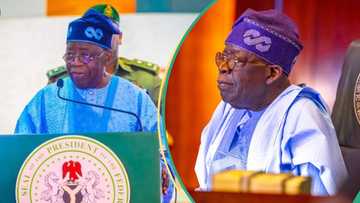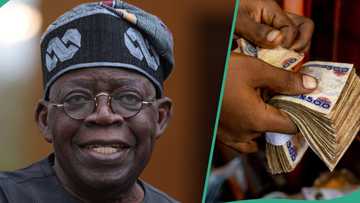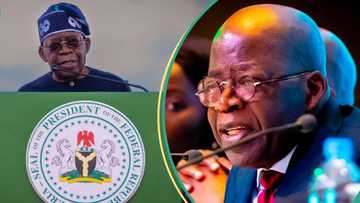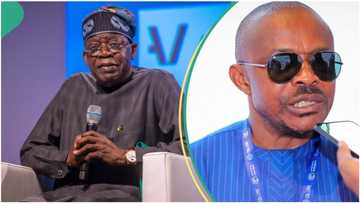Good, Bad: List of Economic Events That Shaped President Tinubu's One-Year Performance in Office
Legit.ng journalist Dave Ibemere has over a decade of business journalism experience with in-depth knowledge of the Nigerian economy, stocks, and general market trends.
PAY ATTENTION: Legit.ng Entertainment Awards 2024 Voting Is Alive. Choose the best entertainer in 15 categories for FREE.
Today, Wednesday, May 29, 2024, marks President Bola Tinubu's one year in office, and Nigerians have had a mixed bag of experiences.
There have been a few bright spots and many events that Nigerians would want to forget quickly.

Source: Getty Images
In his inaugural speech on May 29, 2023, Tinubu wasted no time. He used just three words, "Subsidy is gone," to set the template that has shaped the lives of Nigerians over the past 12 months.
Legit.ng presents the good, the ugly events, and the numbers that provide a snapshot of Nigerians' lives under Tinubu.
The Good: Nigerian Economy growth
Despite the challenges, the Nigerian economy under the Tinubu administration has shown signs of improvement, according to the most recent Gross Domestic Product (GDP) data from the National Bureau of Statistics.
The NBS reported that the Nigerian economy grew by 2.98% (year-on-year) in real terms in the first quarter of 2024.
Before Tinubu came into power, Nigerian economic growth (GDP) stood at 2.31% in the first quarter of 2023.
Wale Edun, the minister of finance and coordinating minister of the economy, in a recent address to journalists, said:
"Nigeria’s economy is experiencing a positive gross domestic product (GDP) growth rate. the agricultural sector, which is critical to the economy, is now showing marginal growth.
“This growth in agriculture provides the monetary authority with the leverage needed to stabilise foreign exchange (FX) rates."
CBN clearing of forex backlogs
Another major win for the Tinubu administration was the payment of debts owed to foreign companies and banks.
In March, the Central Bank of Nigeria announced that it had successfully cleared all valid $7 billion foreign exchange backlogs owed to bank customers, which the previous administration left behind.
Revenue
From his first day in office, Tinubu spoke about his plans to boost government revenue, especially in the non-oil segment.
He wasted no time appointing Taiwo Oyedele, one of the country's best tax experts, to devise ways to boost non-oil revenue.
One year later, based on data from the Accountant General's office, there is more money for federal, state, and local governments to share.
In March 2023, before Tinubu assumed office, the NBS reported that the total revenue shared by all three tiers of government stood at N860.04 billion.
The report said:
"The amount disbursed comprised N487.11bn from the Statutory Account, N120.00bn from Forex Equalization, N12.13bn from Electronic Money Transfer Levy (EMTL) and N240.80bn from Valued Added Tax (VAT).
"The Federal Government received a total of N269.06bn from the N860.04bn, States and Local Governments received a total of N236.46bn and N173.94bn respectively."
Fast-forward to February 2024. The latest allocation captured by the NBS showed that money to all tiers of government has now increased substantially to N2.07 trillion.
NBS provided a breakdown of the money as follows:
"The amount disbursed comprised: N1.15 trillion recorded from the Statutory Account, N479.03 billion from Exchange Gain, N16.59 million from Electronic Money Transfer Levy (EMTL), and N420.73 billion from Value Added Tax.
"The allocations to the three tiers of government for November 2023 were: Federal Government with a total of N407.27 billion States with a total of N379.41 billion, and Local Governments with a total of N278.04 billion."
Another noteworthy development is the stock market's bullish run during the last year of President Tinubu's administration.
Tinubu's govt one year in office: The bad
On the other hand, Nigerians have been plunged into more debt and economic misery.
Fuel prices
The president's 'subsidy is gone' statement saw the cost of fuel rise from an average price of N238.11 per litre at filling stations in May 2023 to N701.24 in April 2024, as reported by the NBS.
This indicates a significant 194.5% increase in how much Nigerians pay at filling stations.
National debt repayment
Another tough challenge for the Tinubu administration is the increase in the nation's debt burden.
Before Tinubu came to power, the Debt Management Office reported that Nigeria's public debt in March 2023 stood at N49.85 trillion.
As of December 31, 2023, the DMO reports that Nigeria's public debt profile has increased by 95.25% to N97.34 trillion.
Inflation rate
This data captures precisely how much more financially stretched Nigerians have become in the last year under the administration of President Tinubu.
When he assumed office, the headline inflation rate stood at 22.41%, while food inflation was 24.82% on a year-on-year basis.
The latest data from the NBS shows that as of April 2024, Nigeria's headline inflation rate has increased to 33.20%, while food inflation has risen to 40.53% year-on-year.
This means that the value of N30,000 in 2023 is now equivalent to N22,556 using real income calculations.
Free fall of Naira
One major reason Nigerians are battling high inflation is the crash of the naira in the foreign exchange market.
When President Tinubu assumed office in May 2023, the official exchange rate of the naira against the US dollar stood at N461.76.
Today, the Central Bank of Nigeria reports that one dollar sells for N1,382.893, indicating that the naira has lost 200% of its value in the last year.
Other big headaches for Nigerians in the one year of the Tinubu administration include the rise in electricity bills, refilling cooking gas, and increase in food items such as rice, garri, and tomatoes among several others.
Generally, cost of living has doubled for Nigerian households in the last one year.
Expert speak
Legit.ng spoke to Ademola Asunloye, a Lagos-based economist, about his assessment of Tinubu's administration.
He said:
"After a year in office, I must say that I am not impressed with the progress. There are numerous distortions, a lack of clarity, and many disjointed decisions being made.
"While I didn't expect miracles within a year, I had hoped for some tangible progress.
"Key socio-economic metrics clearly indicate that Nigerians are worse off over the past year."
Buhari wishes Tinubu success
Legit.ng earlier reported that ex-president Muhammadu Buhari called on Nigerians to support the administration of his successor, Tinubu.
In his goodwill message to Nigerians, Buhari called for strengthened national unity among Nigerians.
The immediate past president congratulated Tinubu for his one year in office and expressed his wishes for the success of his administration.
Proofreading by James Ojo Adakole, journalist and copy editor at Legit.ng.
PAY ATTENTION: Donate to Legit Charity on Patreon. Your support matters!
Source: Legit.ng









